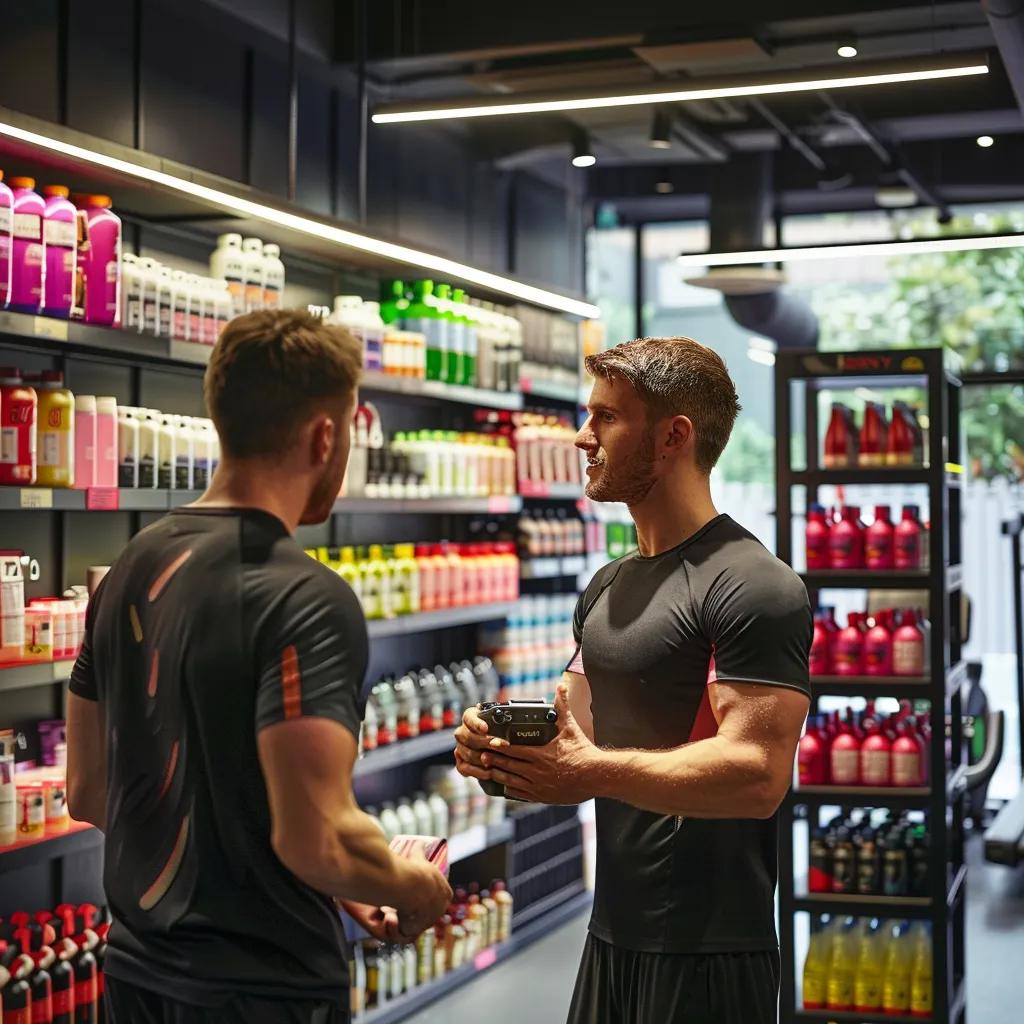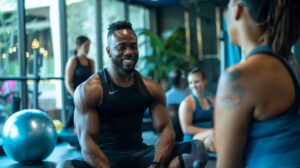
When it comes to achieving peak performance and lasting results in your workouts, nutrition is everything. The food you eat plays a direct role in how much energy you have, how well your body recovers, and how efficiently you build strength and muscle. Whether you’re gearing up for aerobic exercise, endurance training, strength training, or simply want to feel better during your gym sessions, fueling your body with the right nutrients is essential.
A healthy diet built around quality protein, whole grains, fruit, vegetables, and proper hydration isn’t just about performance—it’s also a foundation for long-term health, weight management, and even mental health. The Academy of Nutrition and Dietetics stresses that strategic eating—guided by a certified nutritionist or dietitian—can optimize digestion, stabilize blood sugar, reduce inflammation, and improve sleep, all of which impact physical performance and recovery.
At E5Fit, we help athletes and everyday fitness enthusiasts alike maximize results with smart nutrition strategies. From 1-on-1 personal training to nutrition coaching and custom nutrition protocols, our programs are designed to fuel both your body and your motivation. In this article, I’ll break down the Best Nutrition Tips for Workouts, from optimal pre-workout snacks to smart hydration strategies and muscle-recovery foods. Plus, I’ll share proven insights based on research from experts like the Centers for Disease Control and Prevention and the Mayo Clinic to help you stay informed and energized.
Let’s uncover the essential building blocks that will transform your workout routine—and your results.
Fuel Up Right: Pre-Workout Nutrition Essentials
What you eat before a workout can make or break your performance. The key is to combine carbohydrates, protein, and some healthy fat to provide sustained energy and support muscle function. This combo improves glycogen storage, reduces fatigue, and helps regulate blood sugar during training.
A balanced pre-workout meal might include a slice of whole grain bread with peanut butter, a small banana, and a glass of milk. This blend provides dietary fiber, glucose, and essential amino acids. Timing matters too—try to eat 1–2 hours before you train to allow proper digestion and avoid stomach discomfort. For early risers, a light snack like a smoothie or yogurt with berries can offer quick fuel without overloading your system.
At E5Fit, our coaches often recommend custom online training programs paired with sports nutrition education so clients can dial in pre-workout habits that support their fitness goals, whether that’s weight loss, muscle gain, or endurance.

What to Eat Before Morning Exercise
A bowl of oatmeal topped with fruit and a dash of nut butter offers fast-digesting carbohydrates, vitamins, and healthy fats for early workouts. If you’re in a rush, a slice of toast with almond butter and a cup of juice or water makes for a quick, energizing option. Avoid foods high in added sugar or saturated fat, which may spike and crash your energy.
Hydration Matters Pre-Workout
Proper fluid replacement starts long before your workout begins. Drink at least 16 oz. of water two hours before training. Consider a sports drink if you’re planning a long aerobic exercise session, particularly in the heat. According to the Mayo Clinic, dehydration can increase your body mass index (BMI), strain your heart, and reduce performance.
Smart Snacks That Power Peak Performance
Whether you’re lifting weights or running intervals, the right snack before or after your workout keeps your energy levels stable and your muscles ready for action. Choose nutrient-dense options that blend carbohydrates, protein, and healthy fats—these fuel your performance and jumpstart recovery.
Great options include Greek yogurt with granola, rice cakes with peanut butter, or a smoothie packed with banana, protein powder, and spinach. These snacks provide a steady supply of glucose, support skeletal muscle repair, and aid in glycogen replenishment. According to the American Heart Association, regular snacking on quality foods helps balance blood pressure, prevent inflammation, and reduce the risk of hypertension.
Explore more nutrition coaching options at E5Fit if you’re unsure which snack timing and content work best for your body and training routine.
Post-Workout Snack Ideas for Recovery
After training, your body needs carbohydrates to replenish glycogen stores and protein to rebuild muscle. Try a slice of whole grain toast with avocado and turkey, or a small bowl of brown rice and salmon. Caffeine can also help with fatigue, but keep it moderate—opt for green tea instead of heavy coffee or high-sugar energy drinks.
Snack Timing and Workout Efficiency
The timing of your snack is just as crucial as the content. Aim to snack 30–60 minutes before your session for sustained energy and 15–30 minutes after to boost recovery. Skipping this window can lead to muscle breakdown, fatigue, and reduced exercise performance. For more tips, explore our E5Fit testimonials to see how others fuel their progress.
Hydration Strategies to Avoid Energy Crashes
Water is one of the most overlooked yet essential elements of any training routine. Without proper fluid intake, your body cannot regulate temperature, deliver nutrients, or flush toxins efficiently. Dehydration affects endurance, digestion, muscle contraction, and even mental health—increasing risks of fatigue, cramps, and poor exercise output.
As recommended by the Centers for Disease Control and Prevention, active individuals should prioritize fluid replacement by drinking water regularly—not just during training. Those engaged in longer sessions, endurance training, or sessions in heat may need electrolyte-infused sports drinks. Signs of dehydration include urine that’s dark yellow, dizziness, and muscle soreness post-training.
Need help tracking your hydration habits? Try our In Body Scans at E5Fit to better understand how your body composition and fluid balance impact your workouts.
Water vs. Sports Drinks – What’s Better?
Water is sufficient for most workouts under 60 minutes. For high-intensity sports, long-distance running, or heat-exposed training, sports drinks containing sodium, potassium, and magnesium offer superior electrolyte support. Visit this NASM blog on hydration to explore how proper hydration contributes to longevity and peak performance.
Hydration Tips for All-Day Energy
Drink consistently throughout the day—not just around your workouts. Keep a reusable bottle nearby and flavor your water with citrus, berries, or mint to encourage more sipping. Don’t rely solely on thirst cues; by the time you feel thirsty, dehydration may have already started.
Muscle Recovery Meals That Actually Work
Post-workout nutrition is the gateway to proper recovery and muscle growth. After your session, your body is in a catabolic state—breaking down muscle tissue and burning stored glycogen. The goal? Shift into an anabolic state with nutrient-dense meals that support tissue repair, reduce inflammation, and restore energy.
Ideal post-training meals include lean protein (like turkey, tuna, or tofu), vegetables, and complex carbohydrates like brown rice, pasta, or sweet potatoes. These meals stabilize insulin, replenish glucose, and promote skeletal muscle recovery. According to the American Heart Association, balanced post-workout meals can also improve cholesterol and regulate blood pressure.
We guide our clients through proper post-workout nutrition in both Small Group Training and Semi-Private Training at E5Fit. Our nutrition coaching tailors recovery meals for strength, weight loss, or body recomposition.
Examples of Perfect Post-Workout Meals
Try grilled chicken with quinoa and broccoli, or a smoothie with chocolate milk, banana, and protein powder. For those on the go, a whole grain wrap with hummus, salad, and cheese delivers a full recovery punch. Keep portions in line with your calorie and mass goals.
Recovery Tips for Endurance Athletes
If you’re prepping for a marathon or regular running, add fruit, nuts, and yogurt to your recovery strategy. These foods are rich in vitamins, nutrients, and dietary fiber, reducing inflammation and aiding in faster digestion. For more on movement-based recovery, check out NASM’s mountain climbers workout.
Nutrient Timing: When You Eat Matters
Eating the right foods is important—but when you eat can make a huge difference in your performance, recovery, and even your weight management. Strategic nutrient timing helps regulate blood sugar, control hunger, and enhance muscle growth while minimizing fatigue and fat storage.
Aim to eat every 3–4 hours to maintain energy levels and support digestion. For early exercisers, a light snack before and a more substantial meal after can improve results significantly. Don’t skip breakfast—starting your day with protein, carbohydrates, and healthy fats boosts metabolism and muscle protein synthesis.
Need a schedule designed around your lifestyle? Try E5Fit’s Custom Online Training Programs which incorporate customized meal plans and hydration reminders to ensure your timing matches your goals.

Why Meal Timing Supports Hormonal Balance
Strategic eating helps regulate insulin, glucose, and ghrelin, the hormones that impact hunger, stress, and fatigue. Proper timing reduces risk of obesity, hypertension, and metabolic dysfunction. Learn more about balancing meals from the Mayo Clinic experts.
Breakfast Options That Fuel Morning Workouts
Great pre-work breakfast ideas include a cereal with milk and berries, or avocado toast with a boiled egg. These combinations offer carbohydrates, protein, and healthy fats, ideal for endurance training or early strength workouts. Want more options? Our Buckhead Culinary Guide shares local spots where you can grab performance-ready fuel.
The Power of Micronutrients and Supplements
While macronutrients like protein, carbohydrates, and fat take the spotlight, micronutrients—like vitamins, minerals, and electrolytes—are vital for your energy, immune function, and muscle performance. Without sufficient magnesium, vitamin D, calcium, or iron, even the best workout plan can lead to fatigue, poor recovery, and muscle cramps.
Supplements can help bridge gaps, especially for those with dietary restrictions. But real food should come first—focus on leafy greens, berries, avocados, salmon, tofu, and whole grains like brown rice and oatmeal. These foods improve bone health, support blood pressure, and assist with digestion and weight management.
At E5Fit, we educate clients through 1-on-1 Personal Training and Hype Sessions to ensure proper nutrient intake aligns with fitness goals. And if you’re over 40 or approaching menopause, check out our guide: Buckhead’s Guide for Seniors—it’s full of smart adaptations.
Should You Take a Multivitamin or Not?
If your diet is well-rounded and includes plenty of vegetables, nuts, fruit, lean meat, and grain, you may not need a multivitamin. However, for those facing deficiencies, stress, or intensive training, supplementation may improve recovery and energy. Consult a dietitian for guidance.
Best Foods for Micronutrient Support
Think sweet potatoes, almonds, olive oil, spinach, poultry, and dairy like cheese or yogurt. These provide nutrients critical for muscle recovery, blood health, and inflammation control. Learn more at NASM’s blog on Blue Zone Diets.
Long-Term Nutrition Strategies for Lasting Energy
The best way to stay energized during workouts and in daily life is to commit to a sustainable, enjoyable lifestyle. This includes regular physical activity, a balanced diet, quality sleep, stress-reducing practices like breathwork classes, and accountability from a trusted coach or community.
Ditch quick fixes like extreme fasting, ketogenic diets, or over-relying on caffeine or chocolate. Instead, adopt flexible, evidence-backed habits: eating mostly whole foods, limiting added sugar, staying hydrated, and balancing macronutrients in every meal.
For expert-led support, consider Nutrition Coaching and Custom Nutrition Protocols, or check out Private Gym Memberships at E5Fit. Our About Us page shares more about how we guide you with consistency and accountability.
How to Build a Sustainable Nutrition Routine
Start small: Add one new vegetable a day, drink more water, swap white bread for whole grain, or replace soda with fresh juice. These changes help regulate insulin, prevent obesity, and support mental health—a crucial element of long-term success.
Why Accountability Boosts Nutrition Results
Having a coach, community, or even a buddy keeps you on track. E5Fit’s Small Group Personal Training and Hype Sessions combine coaching with real support. Research from the Academy of Nutrition and Dietetics shows that accountability improves compliance and success.
FAQs: Your Questions Answered
ð¡ What services does E5Fit offer for fitness and nutrition?
We offer a wide range of personalized options:
1. What is the best pre-workout meal?
A light meal with carbohydrates, protein, and a little fat—like banana and peanut butter on toast—supports blood sugar, endurance, and digestion.
2. Is drinking chocolate milk after workouts healthy?
Yes! Chocolate milk contains protein, carbs, and electrolytes that aid in recovery and replenish glycogen stores.
3. How much water should I drink during a workout?
Sip 7–10 oz. of water every 10–20 minutes during exercise. Add a sports drink if your workout lasts over an hour or involves intense heat.
4. Where can I learn more about post-workout recovery foods?
Our blog shares tons of nutrition tips, or explore this NASM guide to battle ropes workouts to pair fueling with performance.
Author: Elizabeth Grace, CPT, CNC Certified Personal Trainer | Certified Nutrition Coach | Fitness Content Specialist Elizabeth is a seasoned fitness writer and certified coach specializing in personalized training, sports nutrition, and wellness content. With over 10 years of experience working alongside top gyms and coaching platforms, she helps bridge the gap between science and strategy. Elizabeth partners with brands like E5Fit to create SEO-optimized, trustworthy content grounded in the latest research from the Academy of Nutrition and Dietetics, NASM, and the Centers for Disease Control and Prevention.
Conclusion: Unlock Your Workout Potential With Smart Nutrition
Fueling your body with the right nutrition—before, during, and after your workouts—can significantly improve your performance, recovery, and long-term health. From choosing the right carbohydrates and protein to staying hydrated with fluids, and focusing on micronutrient intake, these strategies aren’t just short-term hacks—they’re long-term wellness habits.
Whether your goal is weight loss, building muscle, improving mental health, or running a marathon, your success depends on your ability to feed your body intelligently. And with E5Fit’s expert-led services like Nutrition Coaching, Personal Training, and Private Gym Memberships, you’re never alone in your journey.
Explore more resources via our FAQs, Team, or Contact Us pages, and read our Privacy Policy and Terms and Conditions to learn how we protect your wellness journey.


